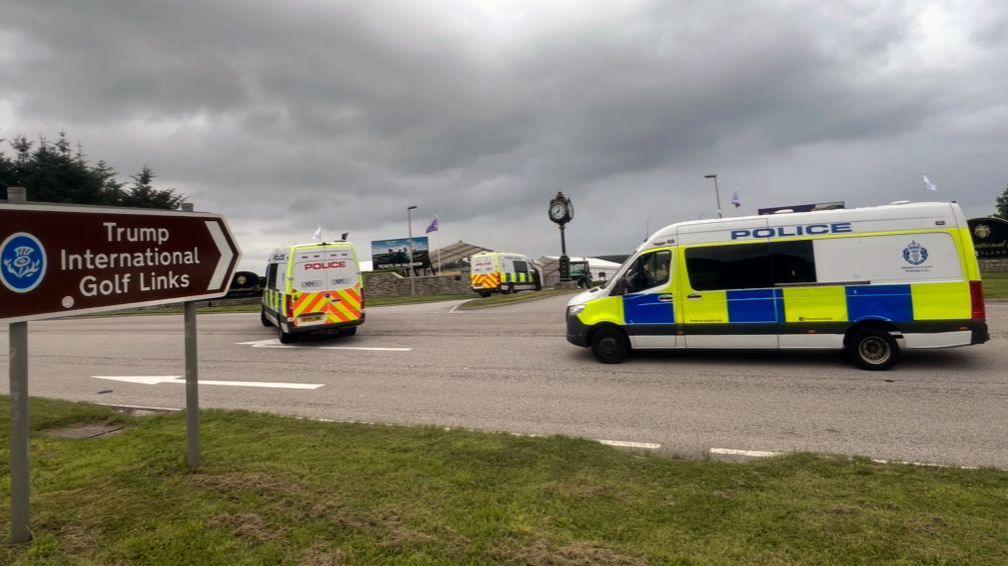Trump takes time out to open Scottish golf course
As Donald Trump heads to Scotland, what to expect from his visit
- Published
Donald Trump flies into Scotland later to visit two golf resorts which he owns in the country where his mother was born.
He will travel to Turnberry in South Ayrshire, a world-class venue he bought in 2014, and to Menie in Aberdeenshire to open a new 18-hole course.
The White House says Trump will also meet Prime Minister Sir Keir Starmer to discuss trade while he is in the UK.
The trip is exceptional as US presidents rarely promote their personal interests so publicly while in office.
It is not the first time that Trump has been accused of conflating his own affairs with the nation's.
Even so, with Gaza and Ukraine in flames, the dollar on the slide and questions mounting about his ties to convicted paedophile Jeffrey Epstein, Trump's decision to focus on golf has raised eyebrows.
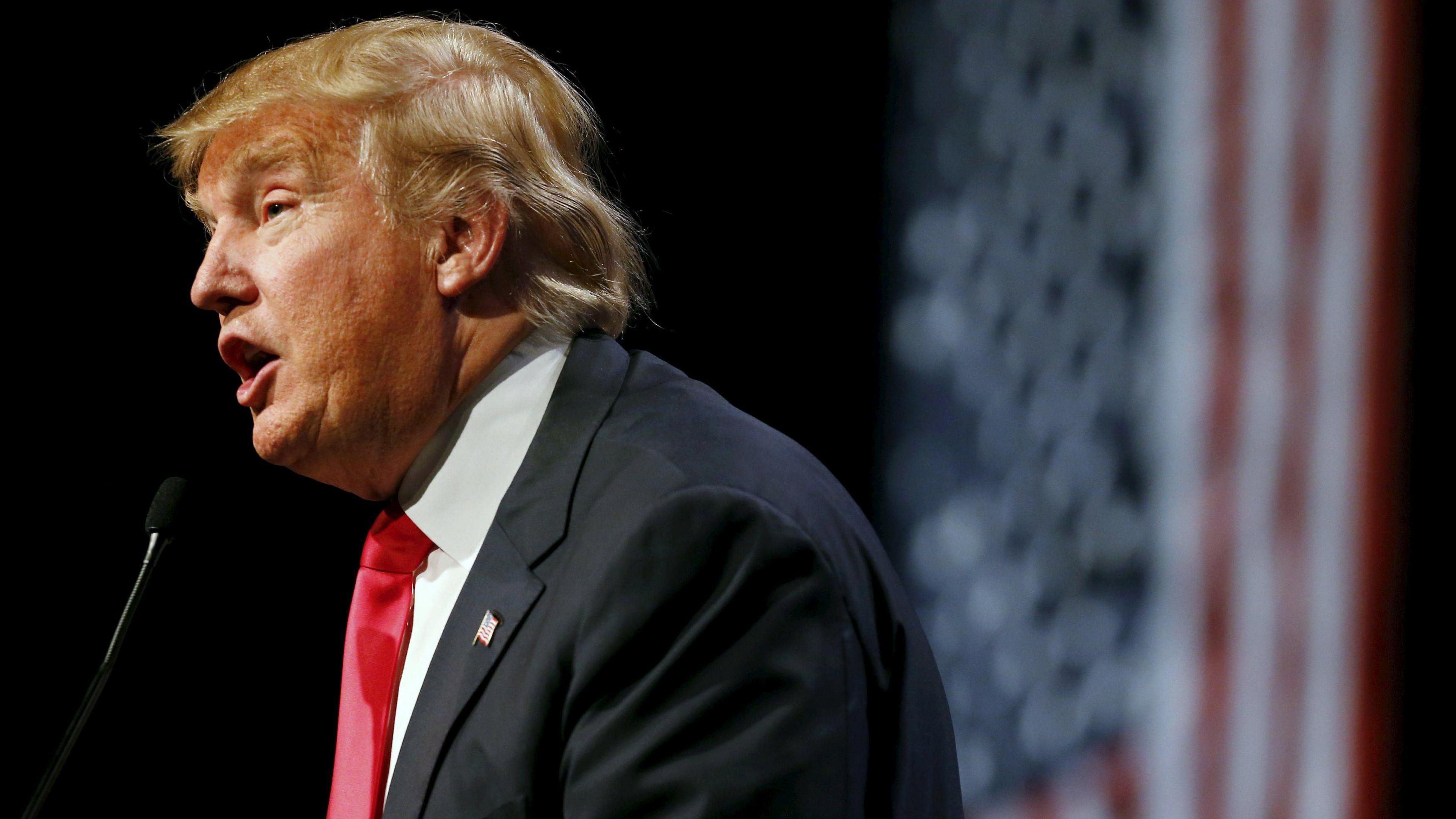
In Las Vegas a decade ago Trump was keen to promote his Scottish golf courses
I witnessed Trump's unconventional attitude first hand right at the start of his political career when I met him on the campaign trail in 2015. The Republicans were searching for a candidate who could win back the presidency after Barack Obama's two terms in office.
Trump strode off the debate stage in a glitzy Las Vegas hotel and into a room packed with cameras.
Jostling for position, I asked the man with the long red tie a couple of questions and, after boasting about his status as frontrunner in the race, he told me he had a message for the UK.
This will make news, I thought. Maybe something about immigration, Trump's signature campaign topic?
It was not. Instead Trump wanted BBC viewers to know that he had some fine golf courses on Scotland's shores which they should visit.
The answer struck me as remarkable for a man aspiring to become the so-called leader of the free world.
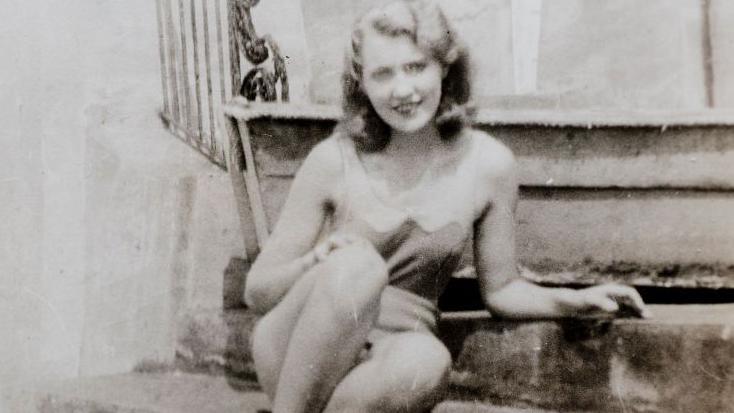
Donald Trump's mother, Mary Anne MacLeod, grew up on the Isle of Lewis before emigrating to America
Of course Trump does have a genuine link to Scotland.
His Gaelic-speaking mother, Mary Anne MacLeod, was born in 1912 on the island of Lewis in Scotland's Outer Hebrides and left during the Great Depression for New York where she married property developer Fred Trump.
Their son's return to Scotland for four days this summer comes ahead of an official state visit in September when the president and First Lady Melania Trump will be hosted by King Charles at Windsor Castle in Berkshire.
Trump is not scheduled to see the King on this visit but it is not entirely private either as he will meet Scotland's First Minister John Swinney as well as the prime minister.
Business leaders, including Scotch whisky producers, are urging Starmer and Swinney to use their meetings with Trump to lobby for a reduction in US taxes on imports, known as tariffs.
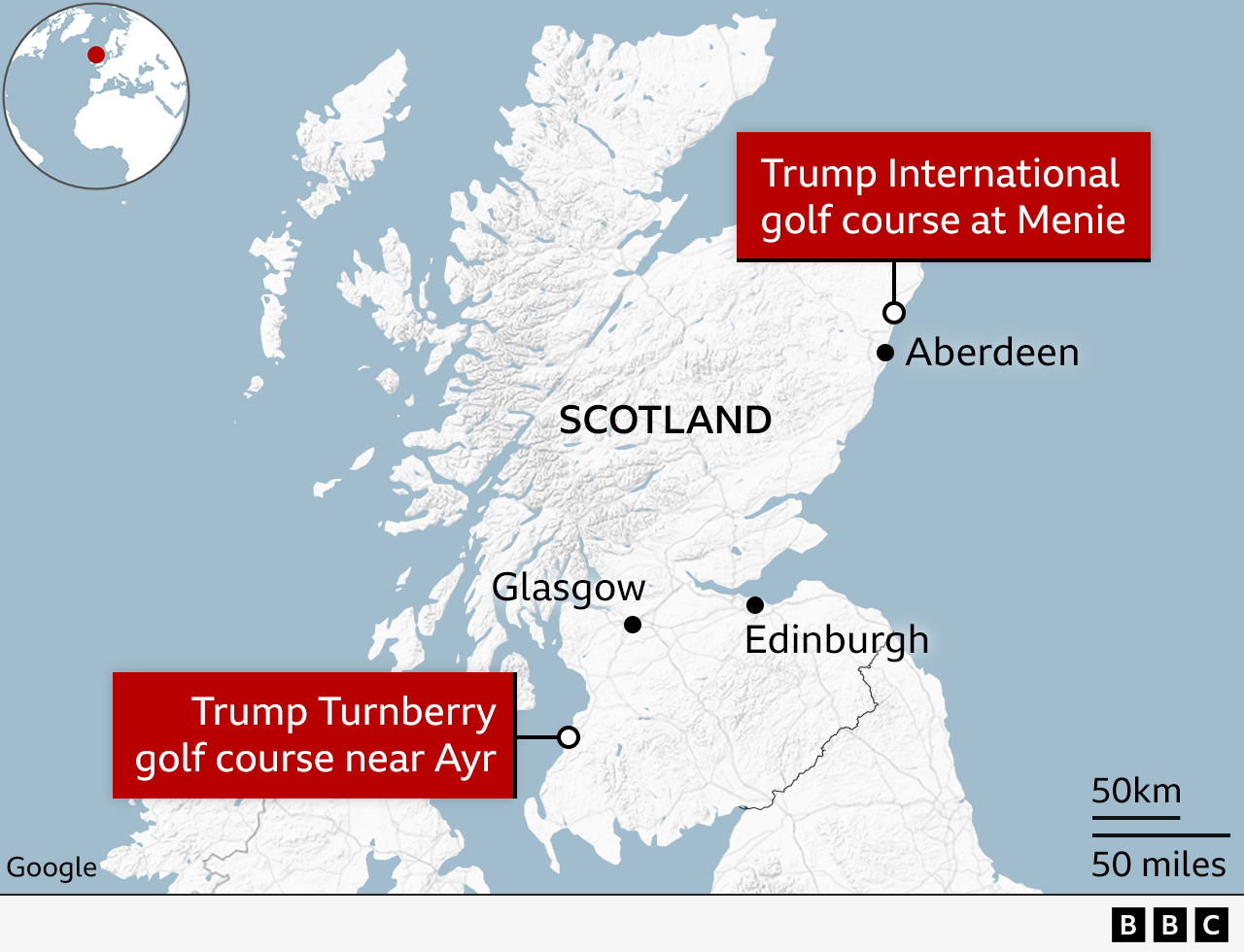
A huge security operation, which has been under way for weeks, has been scaled up in recent days.
Giant transport aircraft carrying military hardware, including the president's helicopters, known when he is on board by the call sign Marine One, have been spotted at Aberdeen and Prestwick airports.
Roads and lanes in Aberdeenshire and Ayrshire have been secured and closed.
Airspace restrictions have been issued.
Police reinforcements have been heading north across the England-Scotland border.
Visits to Scotland by sitting US presidents are rare.
Queen Elizabeth hosted Dwight D Eisenhower at Balmoral in Aberdeenshire in 1957. George W Bush travelled to Gleneagles in Perthshire for a G8 summit in 2005 and Joe Biden attended a climate conference in Glasgow in 2021.
The only other serving president to visit this century is Trump himself in 2018 when he was met by protesters including one flying a paraglider low over Turnberry, breaching the air exclusion zone around the resort.
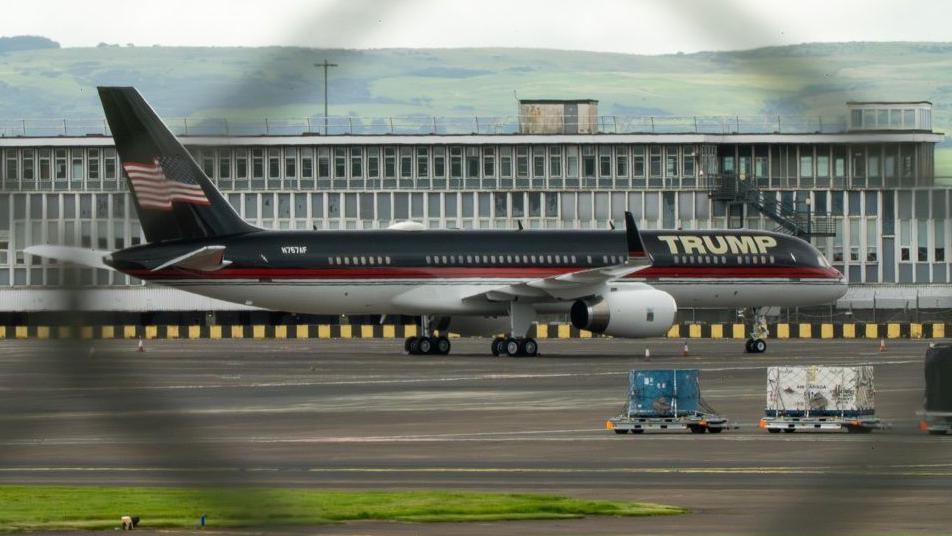
Donald Trump's private Boeing 757 jet parked on an aircraft ramp at Prestwick Airport in Ayrshire, Scotland, ahead of the US President's planned visit
Even by the standards of Donald Trump the years since have been wild.
When he lost the 2020 election to Joe Biden a mob of Trump supporters responded to their leader's false claims of electoral fraud by mounting a violent assault on the US Capitol.
Four years later Trump staged a stunning political comeback.
He survived an assassination attempt while running for the White House and a man has been charged with trying to assassinate then-candidate Trump by aiming a rifle through a fence at his West Palm Beach golf course.
Amid this turmoil, security surrounding the president is supposedly tighter than ever.
The US Secret Service, much criticised for failures which nearly cost the president his life, remains primarily responsible for his safety but concerns have been raised about the impact of his visit on Police Scotland's officers and budget, with one former senior officer estimating the policing cost at more than £5m.
Adding to the pressure which the police are under to secure his resorts, large anti-Trump demonstrations are expected to be held in Aberdeen and Edinburgh.
Police Scotland insists it has the resources it needs to deal with the visit.
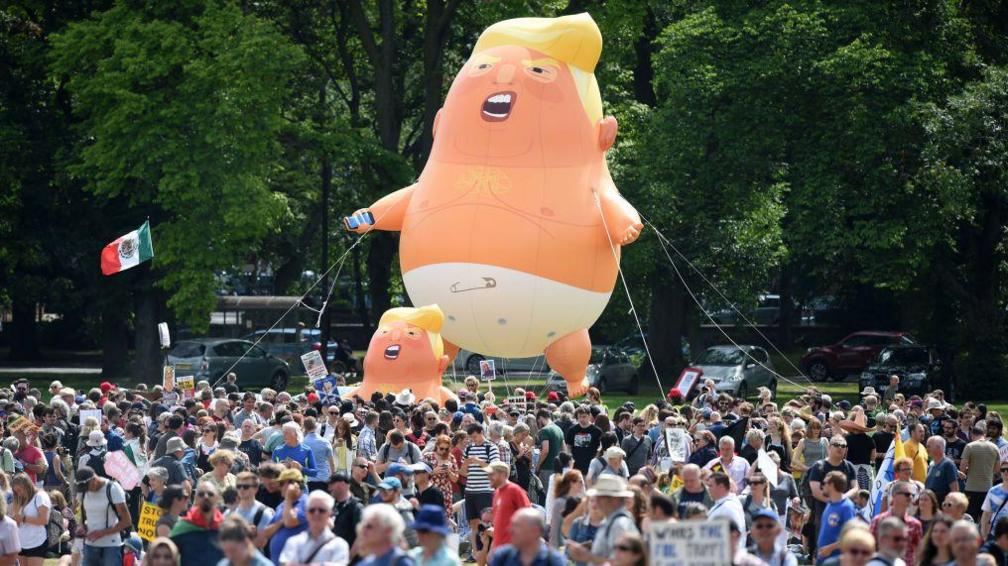
Trump's last visit as president sparked protests across the country
While polls suggest Trump is deeply unpopular in the UK, external, he may actually find some sympathy in Aberdeen, a city which he and many others call "the oil capital of Europe".
He has stirred the heated debate about the nature and pace of the transition from fossil fuels to renewable energy, telling BBC News last week that Aberdeen, which has prospered for decades from North Sea drilling, "should get rid of the windmills and bring back the oil."
The environmental campaign group Uplift says Trump's claim that the North Sea can still provide the UK with a secure energy supply "runs counter to reality."
Trump's pro-oil message echoes the rhetoric of Reform UK, the right-wing party led by Trump fan Nigel Farage which made progress in a recent Scottish by-election and hopes to go one step further by winning seats for the first time in next year's Scottish parliamentary election.
The Scottish Parliament, known as Holyrood after its location at the foot of Edinburgh's Royal Mile, runs much of Scotland's domestic affairs, such as health, education and some taxation and benefits, while the UK parliament in London retains control of defence, foreign affairs and wider economic policy.
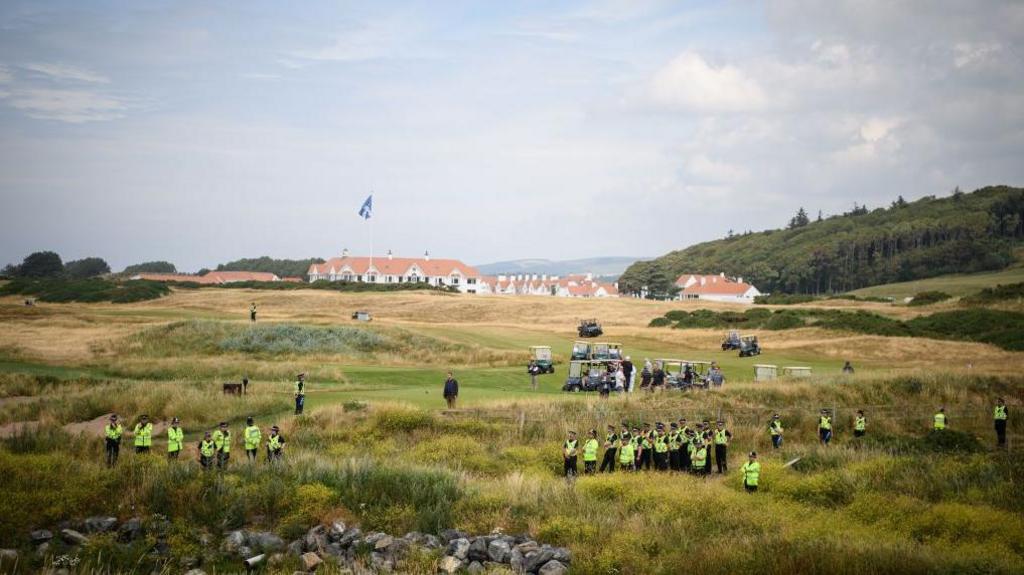
Security and police teams surrounded the perimeter of Turnberry as Donald Trump played golf on his last visit as president in July 2018
Trump's support for the oil industry is well known but his hatred of wind turbines appears to run even deeper.
In 2012 he told me that building a wind farm off the coast of his golf course at Menie would be a "terrible error" that would "destroy Scotland."
That encounter was a strange experience.
At first, Trump's aides told us he was so affronted by the difficult questions he had been asked by Rona Dougall of STV News earlier that morning that he had changed his mind about speaking to the BBC.
We waited anyway in the rain, for hours. Eventually the man himself emerged. After some verbal sparring he offered us burgers from a barbecue before backing down and agreeing to be interviewed.
Later, asked by a committee of the Scottish Parliament in Edinburgh to provide evidence to back up his claim that Scottish tourism would be ruined by wind turbines, Trump famously replied: "I am the evidence."
The wind farm was built anyway and is now clearly visible from the course.
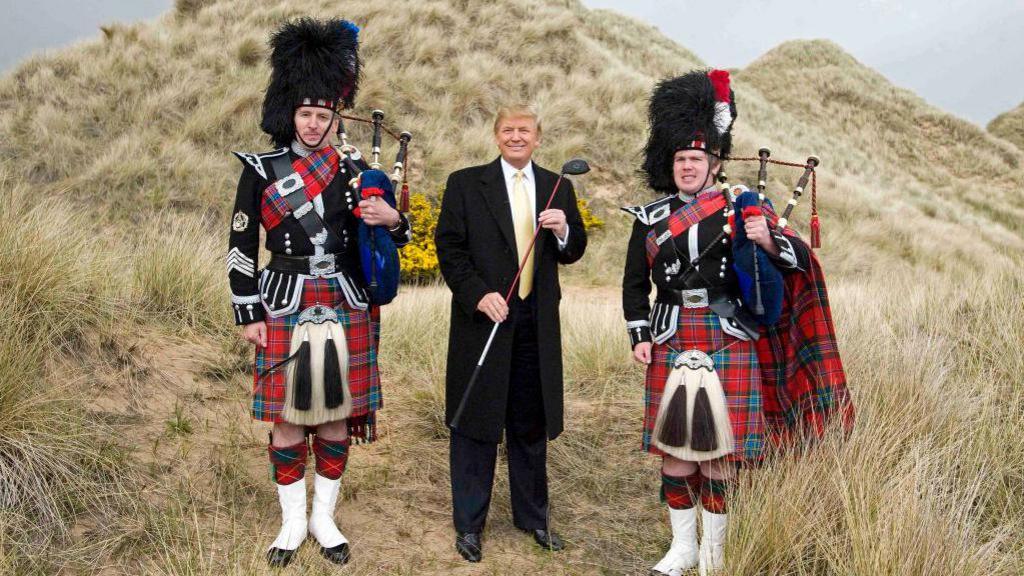
Donald Trump poses with Scottish pipers during a visit to the construction site of his golf course on the Menie Estate in 2010
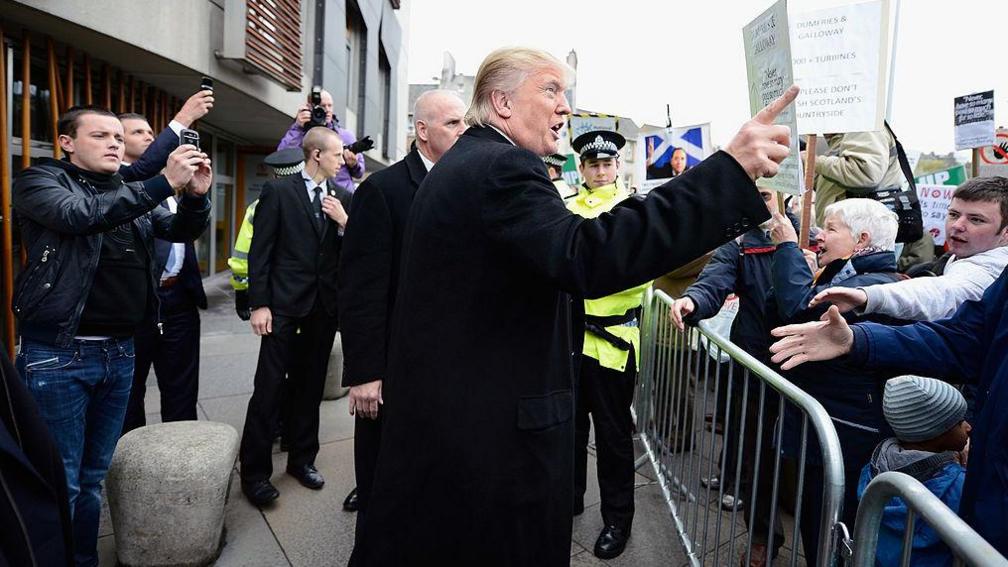
Trump appeared at the Scottish Parliament in 2012 to complain about wind turbines near his golf course
It is not the only battle Trump has fought against a backdrop of shifting sand dunes and whispering grasses at Menie where he has repeatedly clashed with local residents, politicians and environmentalists for a variety of reasons.
His other course at Turnberry is not controversial itself but it is the stage for a tussle with the golfing authorities because Trump appears to be infuriated by the refusal of the game's governing body, the R&A, to stage the prestigious Open Championship there, citing logistical challenges.
Turnberry is home to three golf courses, said to be the most expensive to play in the UK, and the Open has been held there four times but never since Trump purchased it in 2014.
It is another striking example of how, a decade after mounting what was essentially a hostile takeover of the US Republican Party, the man who has been both the 45th and 47th president of the US has still not entirely swapped business for politics.
He is the most powerful man in the Western world and yet Donald Trump is still irked at being snubbed, still hankering for status, still angry about a golfing deal he has, so far at least, failed to close.
Related topics
- Published26 July
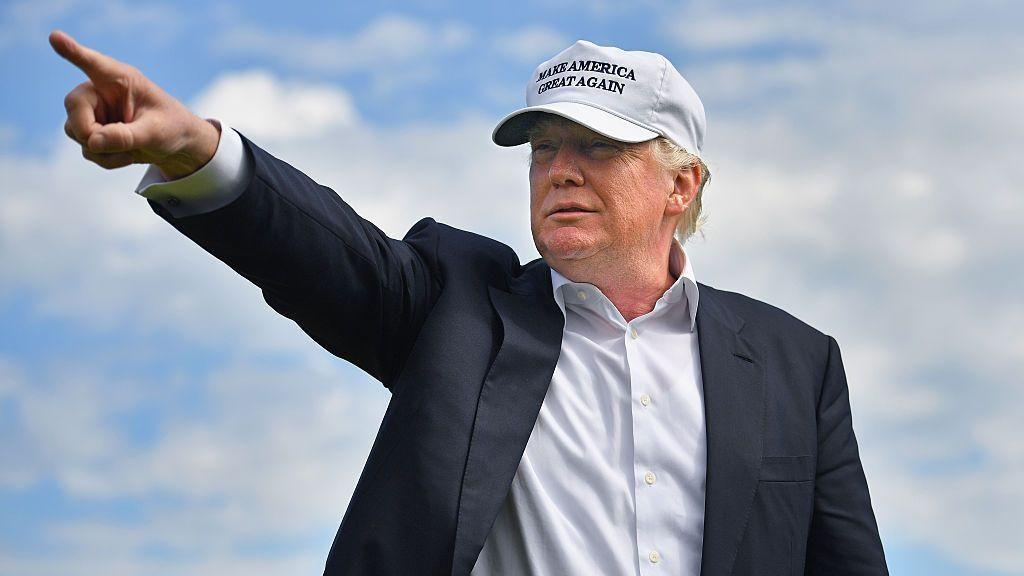
- Published11 July

- Published24 July
